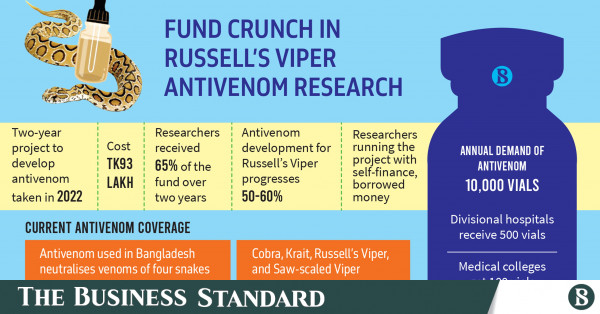Fund crisis bites research project for Russell’s Viper antivenom


According to a 2018 WHO report, around 700,000 people in Bangladesh are bitten by snakes every year and 6,000 of them are killed by the bite
Infograph: TBS
“>
Infograph: TBS
Research on developing an antibody for Russell’s Viper venom in the country has stalled due to a funding crisis, despite making 50-60% progress.
In recent years, Russell’s vipers have been a common cause of snake bites in the country, while no antivenom here is 100% effective against it.
The government initiated the project in 2018 to address the increasing cases of Russell’s Viper snake bites, establishing the Venom Research Centre at Chattogram Medical College and the Animal Immunisation Lab at Chittagong University.
Researchers there have been working to develop an antibody against Russell’s Viper venom.
From the antibody, a fully effective antivenom can be produced.
However, due to a funding crisis, the final phases of developing the antibody have been stalled.
According to researchers involved, a two-year project worth Tk93 lakh was approved in 2022 for developing the antibody and scheduled to end this July. The researchers have so far received 65% of the funds. They sought more funds but haven’t received them yet, hindering the research.
Dr Aniruddha Ghose, chief investigator of the Venom Research Centre and Animal Immunisation Lab, told TBS, “The health ministry was supposed to release funds in three phases to complete the project. As the project nears its end, we still haven’t received the final phase of funding, which is affecting research progress.
“The ministry says they’ll release the funds after we submit our research results, making us feel like contractors.”
Contacted, Abdus Salam, deputy secretary of the Budget Section of the Ministry of Health and Family Planning, said, “I will need to check before making any comments on the issue. The planning wing can provide information about this project.”
Nargis Khanam, additional secretary of the Planning Wing of the ministry, could not be reached for comment.
Dr Abdullah Abu Sayeed, coordinator and investigator of Venom Research Centre, told TBS, “We operate two labs for this project. The Venom Research Lab at Chattogram Medical College handles snake rearing, venom collection, and storage at controlled temperatures. The Animal Immunisation Lab focuses on developing the antibody by injecting venom into animals and collecting the antibodies produced.
“We’ve completed 50-60% of the research phases for developing the Russell’s Viper antibody. Now, we need funds for synthesising the antibody and testing it in various stages, but we haven’t received them yet,” Dr Sayeed added.
“We are now running the project with self-finance. Sometimes, we have to borrow money from different organisations to keep the project alive,” he sighed.
“If we receive the funds duly, we will be able to deliver a good result by the end of this year,” Dr Sayeed hoped.
Dr Wahed Uddin Chowdhury, the supervisor of the Animal Immunisation and Antibody Research Lab, told TBS, “We are at the simulation stage of developing the antibody for Russell’s viper. We are using local goats and chickens for it.
“Once the efficacy test of the antibody is done and we can prove it effective against Russell’s viper venom, pharmaceutical companies can begin producing antivenom.”
Chief Investigator Dr Aniruddha said, “The process follows WHO guidelines, with local researchers trained by WHO representatives and German experts on venom collection and antivenom production.”
According to the Emergency Preparedness and Response Programme of the Non-communicable Disease Control of the health directorate, Bangladesh imports Tk10 crore worth of antivenom from India to treat snakebite patients. The annual demand for antivenom is 10,000 vials.
According to a 2018 WHO report, around 700,000 people in Bangladesh are bitten by snakes every year and 6,000 of them are killed by the bites.
Every year, the health directorate sends 500 vials to divisional hospitals, 100 vials to each medical college, and 50 vials to every sadar hospital.




